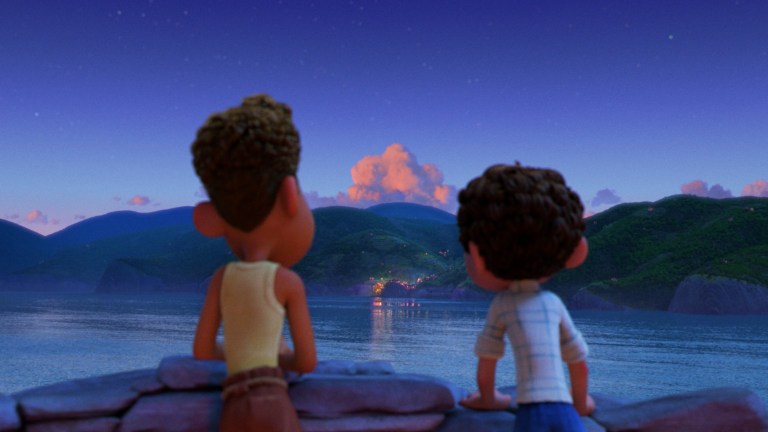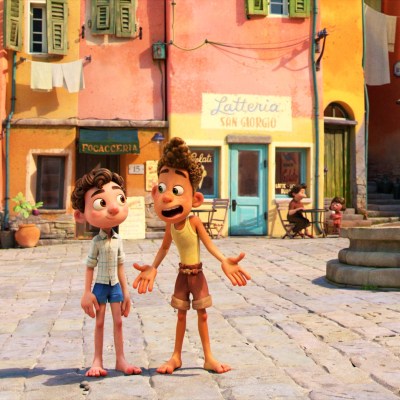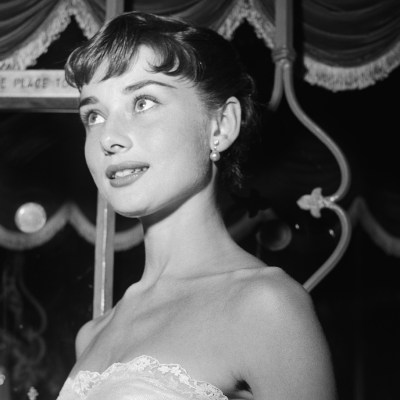Pixar, Italian Style: Why Luca is Set in 1950s Italy
Director Enrico Casarosa taps childhood memories to make Luca the first Pixar movie set in Italy.

Pixar movies have been set in all kinds of places: a coral reef, a closet full of toys, and the inside of the human brain are just a few examples of such creative flights of fancy. But with Luca, the original new fantasy coming from the fabled studio that will stream exclusively on Disney+ next month, director Enrico Casarosa and the filmmaking team have ventured into an exotic new locale: Italy during the 1950s.
Luca is the charming story of two young friends, Luca and Alberto (voiced by Jacob Tremblay and Jack Dylan Grazer respectively), who spend a delightful, seemingly carefree summer in a small town named Portorosso on the Italian Riviera, doing the kinds of things young boys in Italy do: riding Vespas, eating pasta, and seeing what kind of mischief they can get up to. But Luca and Alberto are not your run-of-the-mill boys. They’re sea monsters who can take on human form on dry land but must keep their true natures a secret from the townspeople they meet and interact with.
“What seemed pretty quickly relatable is feeling a little bit out of place or feeling a little bit like you’re not fitting in,” says Casarosa, who has been with Pixar since 2002 and made his directorial debut with the Oscar-nominated short “La Luna” in 2021. “You’re looking for who you are. So when we started thinking about the metaphor of having to look a certain way, but to have a whole hidden identity as a sea monster, it felt very true to the uneasiness of that time.”
While Casarosa says that the friendship between Luca and Alberto is “at the heart of the story” — and is based on his own real-life friendship, which endures to this day — the setting is equally important. “The setting felt true to a story of sea monsters, just because it’s kind of part of the sea and so present in that land. I remember moving to San Francisco and being so happy because I felt like that the bay is present here.”
Casarosa spent his childhood in the Italian port town of Genoa, right on the Riviera and the main inspiration for the setting of Luca. Another major inspiration was Cinque Terre, a stretch of five fishing villages in the province of La Spezia that are nestled among the Liguria region’s rugged cliffs, and are known for the area’s most famous export: pesto sauce.
The director says that he managed to sneak in some details from his hometown of Genoa into the village in Luca, which is situated in the Liguria region. “We’re putting a little Genoa in,” Casarosa confesses. “We wanted as much focaccia in this movie as possible. Focaccia is our bread… I have so many little details where I’m like, ‘Oh, this one is very specific and people in Liguria would probably understand.’ It’s a wonderful area of the world.”
Casarosa adds that he and the Luca production team had a specific goal in mind when it came to setting the movie in the Liguria region and drawing on its many traditions.
“We want to take people in an authentic way to a place,” he explains. “I’ve a lot of pride as an immigrant. I think the further away you are from your roots, the more you appreciate them, and honestly making films has really become my way to embrace my roots as much as possible.”
While based in many ways on his own childhood, Luca does differ from Casarosa’s real life in one important way (well, two, since, as far as we know, he’s not a sea monster). Casarosa experienced his childhood during the 1980s, while the movie is set firmly in the 1950s, with all the period detail one might expect from that era in that part of the world.
“I think maybe because of the tube socks, the ‘80s seemed less interesting to me,” says Casarosa with a laugh when asked about the choice to set the film in the 1950s. “I grew up in the ‘80s. Nowadays the 80s are quite popular. But I feel it goes to the inspiration of the wonderful music from the ‘50s and ‘60s, the inspiration of the design of all the vehicles… It really was an aesthetic, beauty and a musical choice, and then a timelessness. When you go to an older era, it can feel a little more timeless.”
The little details of the era can be found in all kinds of corners of the movie, including the movie posters for films like Roman Holiday and La Strada, just two examples of the classic filmmaking era surreptitiously on display.
“It was after, first of all, a period that I love,” affirms Casarosa when asked whether the films of the era influenced his own. “So part of it is just my love of that golden era of film and cinema in Italy. I love the music in all these coming-of-age stories of summer. Music is a huge, huge part of a movie — I just love the music of the ’50s and ’60s in Italy, so we’re using a lot of that. And then the design, the old Vespas, the old, little cart-bicycle, I just love the sense that this has an old feel.”
Even the central conceit of the story — the idea that these two boys, Alberto and Luca, are actually sea monsters pretending to be human — was influenced in some ways by local legends along the Riviera. “There are a few different ones,” says Casarosa. “There is a wonderful town close to Cinque Terre that has, for example, a legend of a helpful octopus that rang the bell when the pirates were coming. I always found it fascinating. But you visit the place, the bell and the church are right on the sea. So you can see why people would think an octopus can definitely walk out and ring the bell.”
All of this — from the movie posters to the little Vespas buzzing around the streets to the food and more — extends the idea in Luca that the setting is almost a character itself, and that even an animated film can transport you for the first time to a distant new place, whether it be the Great Beyond or a quaint yet beautiful little riverside village in Italy, with as much authenticity as possible.
“We want to tell the real story, we want it to be authentic,” says producer Andrea Warren. “Obviously Enrico was a resource of a lot of that, but we did also create what we call a Pixar culture trust, which includes different folks from that area. It was really wonderful to hear a little bit of a different perspective on what authenticity means… we really appreciated all of that advice and input to create the best and the most authentic version that we could of Portorosso.”
Luca premiers exclusively on Disney+ starting on June 18.


